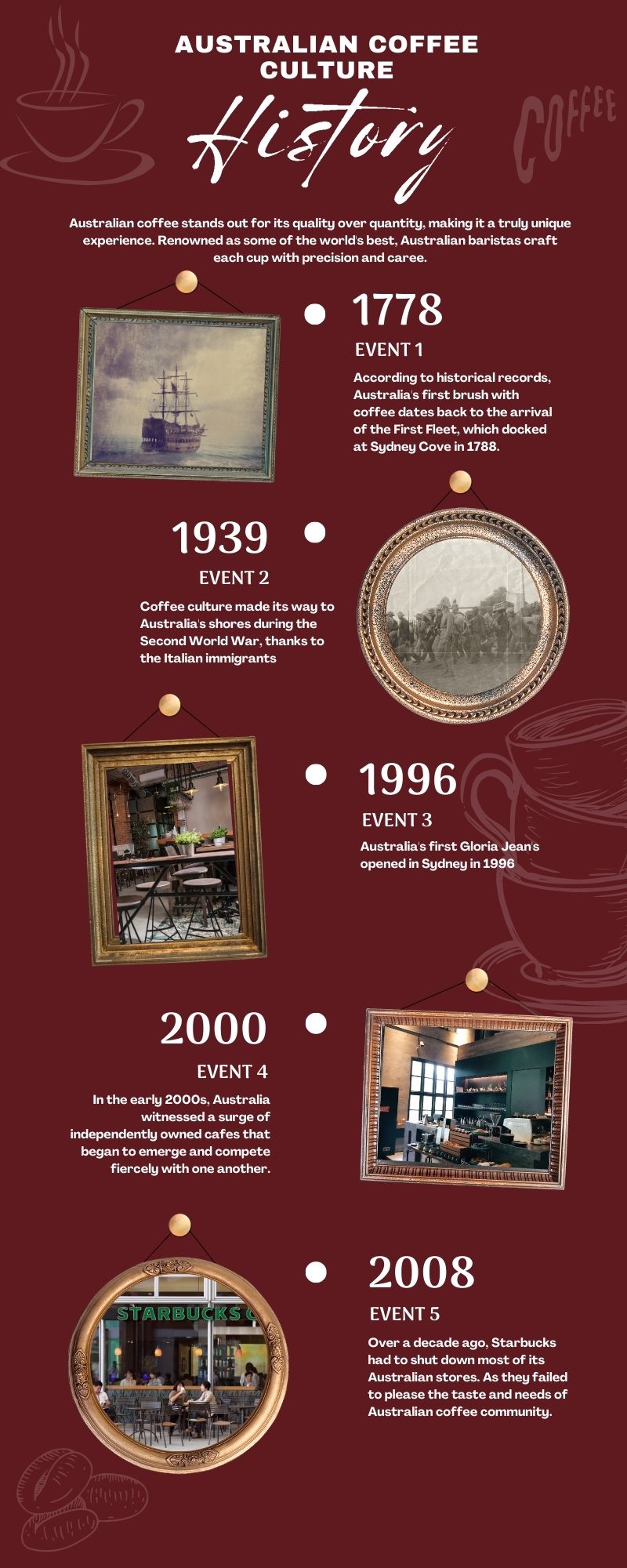Last Updated on April 23, 2023 by Timothy Byron Smith
Coffee is more than just a beverage in Australia. It’s an integral part of the Australian way of life, with a rich history and culture that is as diverse as the country itself.
The history of Australian coffee dates back to World War II, when Italian and Greek immigrants began bringing coffee makers and espresso coffee to Australia, Melbourne. It transformed how coffee was consumed, and over time, its appeal in inner cities and fueled the development of a distinct coffee culture in Australia.
From the rise of specialty coffee to the role of Italian immigrants in Australian history, this article will explore the unique characteristics of coffee culture in Australia.

The Rise of Specialty Coffee in Australia
Australia has experienced a boom in specialty coffee over the past few decades. Specialty coffee refers to high-quality coffee that is sourced, roasted, and brewed with a focus on flavor and quality.
In Australia, the popularity of specialty coffee can be traced back to the 1980s, when espresso machines became more widely available locally.

Since then, the number of specialty coffee shops and roasters has grown exponentially. Australians have become increasingly sophisticated in their coffee tastes, demanding high-quality coffee and knowledgeable baristas.
The country now boasts some of the best specialty coffee shops in the world, with a strong emphasis on ethically sourced and sustainable coffee.
The Role of Italian Immigrants in Australian Coffee Culture
The influence of Italian immigrants on Australian coffee culture cannot be overstated. Italians began migrating to Australia in large numbers after World War II, bringing with them their love of coffee and espresso culture.
It wasn’t long before espresso machines started appearing in cafes across Australia, and the Australian coffee culture was forever changed.
Italian-style espresso became the preferred way to enjoy coffee in Australia, with the “long black” and the “flat white” emerging as the two most popular coffee drinks. The long black is similar to an Americano, while the flat white is a creamy espresso-based drink similar to a latte.
These two drinks are now an integral part of Australian coffee culture, with many Australian cafes serving them alongside a range of other coffee styles.
Australian Coffee Styles
Australian coffee culture has its own unique style, with a range of drinks that are popular throughout the country. In addition to the long black and flat white, Australians enjoy a range of other coffee styles, including the cappuccino, latte, and macchiato.
One popular variation of the latte in Australia is the “magic coffee,” which is made with a double ristretto shot of espresso and steamed milk. The magic is a strong, smooth coffee that is perfect for those who love a good espresso but want something a little creamier.

Another unique variation of the flat white is the “magic flat white,” which is made with a double ristretto shot of espresso and a little less milk than a regular flat white. This creates a stronger, more intense coffee that is perfect for those who like it with a little extra kick.
The Coffee Industry in Australia
Coffee has become a big business in Australia, with the industry generating billions of dollars in revenue each year. There are now thousands of coffee shops and roasters across the country, each with its own unique take on Australian coffee culture.
The coffee industry in Australia has also become a major employer, with thousands of people working in cafes, roasteries, and coffee shops across the country.
Coffee has become an integral part of the Australian economy, with the industry contributing significantly to the country’s GDP.
Read More: 8 Reasons Why Starbucks Failed In Australia
Sustainability in Australian Coffee Culture
Sustainability has become an increasingly important issue in Australian coffee culture. Many coffee shops and roasters are now focusing on sustainable practices, such as using ethically sourced coffee and reducing waste to address global warming and a safe environment.
Some cafes even offer reusable cups and straws, and many have switched to biodegradable or compostable packaging.
Sustainability is not just an environmental issue, but also an economic one. By adopting sustainable practices, coffee shops and roasters can reduce their operating costs, increase their profits, and create a more sustainable future for the industry as a whole.
As consumers become more aware of the impact of their choices on the environment, sustainability is likely to become an even more important trend in Australian coffee culture in the years to come.
FAQs
What is the most popular coffee drink in Australia?
The most popular coffee drink in Australia is flat white, which is made with espresso and steamed milk. It is similar to a latte but with less milk and more espresso.
What is specialty coffee?
Specialty coffee refers to high-quality coffee that is sourced, roasted, and brewed with a focus on flavor and quality. It is often made from single-origin beans and is considered to be of a higher quality than traditional coffee.
How important is sustainability in Australian coffee culture?
Sustainability is becoming an increasingly important issue in Australian coffee culture. Many coffee shops and roasters are now adopting sustainable practices to reduce waste and promote environmentally friendly practices.
What is the economic impact of coffee on the Australian economy?
Coffee is a significant contributor to the Australian economy, generating billions of dollars in revenue each year. The coffee industry also provides employment for thousands of people across the country.
Conclusion
Coffee culture is an important part of Australian life, with a rich history and a diverse range of styles and flavors. From the rise of specialty coffee to the impact of Italian immigrants on Australian coffee culture, there are many unique aspects of coffee culture in Australia that make it stand out from the rest of the world.
As the industry continues to grow and evolve, sustainability will likely become an even more important issue. By adopting sustainable practices and focusing on quality, Australian coffee shops and roasters can continue to thrive and create a more sustainable future for the industry as a whole.

